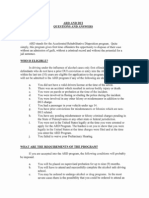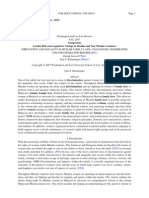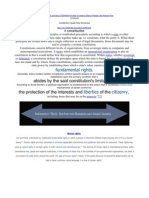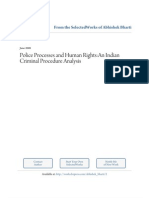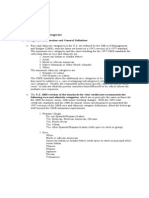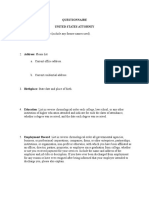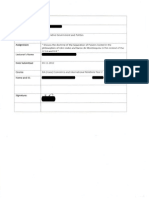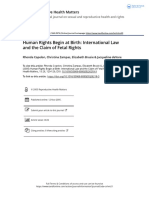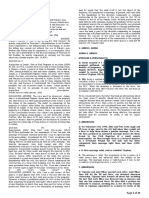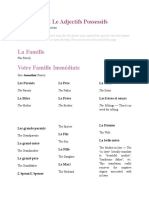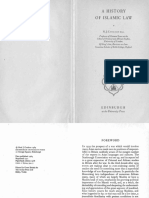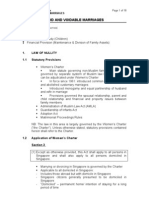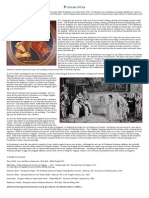Succession Rights
Succession Rights
Uploaded by
Thoondar KatzCopyright:
Available Formats
Succession Rights
Succession Rights
Uploaded by
Thoondar KatzCopyright
Available Formats
Share this document
Did you find this document useful?
Is this content inappropriate?
Copyright:
Available Formats
Succession Rights
Succession Rights
Uploaded by
Thoondar KatzCopyright:
Available Formats
An accredited provider of Continuing Legal Education in the State of New York
Tenancy Rights of Remaining Residents of an Apartment Where the Legal Tenant has Died or Moved Out
If you have been living in an apartment with a family member, friend or roommate who has died or moved out, you may have many questions about your rights in connection with the apartment, and your future ability to stay in your home. The answer to most of your questions will depend on a number of things, including your relationship to the person who moved or passed away, the type of housing that you live in, and whether or not your name was on the lease. Below are some frequently asked questions and answers. Please note: Each persons situation is different, and written materials cannot take the place of direct legal assistance from an attorney. If your landlord brings you to court, or if you need legal help or advice, you can go to www.lawhelp.org/NY for a complete referral directory of free legal services, or call the Association of the Bar of the City of New York at (212) 626-7373.
I was living in my apartment with a roommate who has now passed away, but both of our names were on the lease. What are my rights? If your name is on the lease, then you have all the rights of a tenant under that lease, even if the other tenant is gone. You also have the right to get another roommate, if you want to. What if my name is not on the lease, do I have any right to stay in the apartment? In most cases, if the person who passed away was not a member of your family or like a family member to you, you do not have the right to stay on as a tenant, unless the landlord makes you, or has made you, a tenant. A landlord can make you a tenant directly by agreeing to this and putting your name on the lease. In some cases, a landlord can also make you a tenant in a more indirect way by taking certain steps, such as accepting rent from you in your own name for a long period of time. The best thing to do to try to establish a landlord-tenant relationship is to pay rent directly to the landlord on a regular basis. The longer the landlord accepts your rent -- especially after the landlord knows that your roommate is gone or has died -- the better your chances are of being allowed to remain as a tenant. What if the person who died was a family member? In many cases, a family member living with a tenant who has passed away or left the apartment is protected under the law. Such a family member would have "succession rights". Whether or not you have succession rights as a remaining family member depends on the type of housing in which you live and the type of family relationship that you had with the departing tenant. How do I determine what type of housing I am living in? There are many different types of housing in New York City. You could live in private housing or in public housing. Public housing includes "Housing Authority" or "NYCHA housing". You could also live in a City-owned building, or receive a rent subsidy for your apartment such as Section 8. Public Housing, city-owned housing, and subsidized housing each have their own sets of rules about succession rights for remaining family members. Some of these rules are discussed at the end of this fact sheet. If you live in private housing, you need to know whether your apartment is rent regulated - that is, whether it is subject to either the Rent Control or Rent Stabilization laws. Generally speaking, if the tenant has lived in the apartment since 1971 and there is a maximum rent that the landlord may charge for the apartment, then the tenancy is most likely rent-controlled. In such a case, there would not have to be
a lease. If you are in a building with at least six apartments, and a notice of renewal is sent out when the lease is about to expire, then the apartment is probably rent-stabilized. If you live in a small building of less than six apartments and the tenant moved in after 1971, you probably live in unregulated housing. If you are not sure what kind of housing you live in, you can try contacting the Division of Housing and Community Renewal (DHCR) to ask if your building or apartment is listed as either rent controlled or rent stabilized. You can telephone DHCR at 1-866-ASK-DHCR (1-866-275-3427), or go to http://www.dhcr.state.ny.us/general/contact.htm. Please note that even if your building is not registered with DHCR, it could still be subject to rent regulation. When in doubt, it is always best to consult a housing lawyer.
Rent Controlled and Rent Stabilized Apartments
Which family members have succession rights in rent controlled or rent stabilized apartments? Rent control and rent stabilization laws have similar rules for succession rights. They involve two categories of family members: "traditional" and "non-traditional."[.] Traditional family members who have succession rights include spouses, children, parents, stepchildren, stepparents, brothers, sisters, grandparents, grandchildren, parents-in-law, and children-inlaw. However, aunts, uncles, nieces, nephews, and cousins are not included, and if these family members wish to have succession rights, they must meet the standards of non-traditional family members. Non-traditional family members are individuals who do not have the required blood or legal relationship, but who in reality have the same kind of family relationship as traditional family members who do have succession rights. For example, this category could cover unmarried or "common law" couples, lesbian and gay couples, an aunt who raised you as her daughter, or senior citizens and disabled persons living together as family units with or without a romantic involvement. What are some of the deciding factors in determining whether a non-traditional family member has succession rights? The court looks to see if there was enough financial and emotional interdependence to prove such a family relationship. Some of the factors which are considered include: the length of the relationship; shared household expenses; joint bank accounts, joint credit cards; sharing a household budget for purposes of receiving government benefits; attending family-type functions such as holidays, celebrations, vacations or social occasions; formal legal arrangements such as naming the other in a will or life insurance policy; regularly performing family functions such as caring for each other or for each other's extended family, or raising children together; and holding yourselves out as family members to other family members and to the outside world. You do not have to show all of these factors, but the more that you can show, the easier it will be to prove the family relationship. What else do I have to prove to get succession rights to the apartment? Whether you are a traditional or non-traditional family member, you also have to show that you have lived in the apartment for a long enough time. In most cases, this means you must have lived in the apartment as your primary residence for at least two years immediately before the tenant died or left the apartment. Senior citizens and disabled persons only have to have lived in the apartment for one year before the legal tenant left or died. You are also entitled to succession rights if you moved into the apartment with the named tenant when the tenant first moved in, or have lived in the apartment since the beginning of your relationship with the tenant. For example, if you moved in as soon as you got married to the tenant, you are entitled to succession rights even if you have lived there for less than two years. Can the landlord raise the rent? In most cases, no. A remaining family member with succession rights stands in the shoes of the tenant who died or left the apartment, and should only have to pay the same rent that the old tenant would have paid. In rent stabilized apartments, this means that the landlord is only allowed to get a rent increase when the lease is up, and can only charge the same legally allowed increase that the old tenant would have been charged when the lease was renewed. The landlord would not be entitled to a vacancy allowance rent increase unless this is not the first time that your family has taken succession rights in this apartment.
Public Housing: NYCHA/Housing Authority Rules
What if I live in NYCHA housing - what are their rules for succession rights? You can only qualify for succession rights in NYCHA housing if you meet all three of the following qualifications: (1) You were listed on the original family roster when the tenancy began, or at some later point, you were either granted permission by NYCHA to become a permanent member of the household, or you were born to or adopted by someone who is already an official permanent member of the NYCHA household; and (2) You have continued to live in the apartment and have been listed on the family composition ever since becoming a member of the household; and (3) You are otherwise eligible for NYCHA housing, using NYCHAs rules concerning income and criminal background. What if I am a remaining family member who has lived in the apartment for a long time, but I was never officially added to the household? In such a case, it will be very difficult to get succession rights. Before taking any action, you should try to get the help or advice of a lawyer.
Other Types of Housing
What are the rules for succession rights in City-owned and Mitchell-Lama housing? Succession rights to city-owned housing and state supervised Mitchell-Lama housing are governed by rules, which are similar, though not identical, to the rules for rent-stabilized and rent-controlled apartments. State supervised Mitchell-Lama housing also requires remaining family members to have been listed on the income affidavit (which must be filed annually) and/or in the Notice of Change to Tenants Family form (which must be filed upon a change in the persons occupying the apartment). If you want to succeed to a city-owned apartment, you need to file a Successor Tenant application, which you can get from the manager of your building. What if I live in private unregulated housing? Your right to remain as a tenant will depend on the lease. In most cases, this will probably mean that you don't have any right to stay on in the apartment as a tenant. However, even if the lease does not give you any succession rights, you are still free to try to come to an agreement with the landlord for a lease in your own name. Co-operatives (co-ops) and condominiums (condos) have their own sets of by-laws and leases which may or may not allow an interest in the apartment to be given to a surviving family member in a will or by other operation of law. What else do I need to know? Succession laws can be very complicated. In addition, sometimes landlords, including the City and the Housing Authority, may tell you that you do not have any rights when, in fact, you actually may have some legal protections. When in doubt, it is also best to seek legal advice from an attorney.
You might also like
- Framework For Social Analysis: BSSW Department of Social Work College of Humanities and Social SciencesDocument12 pagesFramework For Social Analysis: BSSW Department of Social Work College of Humanities and Social SciencesAnnabelle Buenaflor89% (18)
- General Information Quiz BeeDocument48 pagesGeneral Information Quiz BeeInvincibleReine100% (3)
- ARD and DUI - Questions and Answers - Adam County, PADocument3 pagesARD and DUI - Questions and Answers - Adam County, PASteve Rice LawNo ratings yet
- The Most Epic Character Chart EverDocument12 pagesThe Most Epic Character Chart EverrisetoyosoapNo ratings yet
- Yvette TanDocument6 pagesYvette TanMel Ann Claire Bagaipo100% (1)
- Fifty Years of The Sound of MusicDocument65 pagesFifty Years of The Sound of MusicChristopher PlummerNo ratings yet
- The Complete Guide to Planning Your Estate in Illinois: A Step-by-Step Plan to Protect Your Assets, Limit Your Taxes, and Ensure Your Wishes are Fulfilled for Illinois ResidentsFrom EverandThe Complete Guide to Planning Your Estate in Illinois: A Step-by-Step Plan to Protect Your Assets, Limit Your Taxes, and Ensure Your Wishes are Fulfilled for Illinois ResidentsNo ratings yet
- Recruiter Report: 57714: Not RecommendedDocument3 pagesRecruiter Report: 57714: Not RecommendedSalaam Bey®No ratings yet
- FreemassoneryDocument20 pagesFreemassoneryhanzukikNo ratings yet
- Westlaw Document 02-42-29Document16 pagesWestlaw Document 02-42-29muzhaffar_razakNo ratings yet
- Synopsis: Relation To Third PartyDocument2 pagesSynopsis: Relation To Third PartySEHAJ SOFATNo ratings yet
- The Magna CartaDocument7 pagesThe Magna CartaRondeauNo ratings yet
- Employment Rights Fact SheetDocument12 pagesEmployment Rights Fact SheetGabrielle JonesNo ratings yet
- Articles of ConfederationDocument6 pagesArticles of ConfederationJaz CiceroSantana BoyceNo ratings yet
- Constitution Façade Fake DemocracyDocument5 pagesConstitution Façade Fake DemocracyFrank GallagherNo ratings yet
- Preparing For Congress 2010Document10 pagesPreparing For Congress 2010william_a_duNo ratings yet
- PROPERTYDocument8 pagesPROPERTYHyder KhanNo ratings yet
- Debt Based Monetary SystemDocument7 pagesDebt Based Monetary SystemEvgeni GrNo ratings yet
- Police Process and Human Rights IndiaDocument17 pagesPolice Process and Human Rights IndiaJohn NikNo ratings yet
- Moorish Guide-Seek Ye The Truth-2... 8!24!1928Document2 pagesMoorish Guide-Seek Ye The Truth-2... 8!24!1928Muhammed Al-ahari0% (1)
- Ohio ConstitutionDocument17 pagesOhio Constitutionapi-266062841No ratings yet
- First Act CongressDocument76 pagesFirst Act Congress3inge23No ratings yet
- Learning The LegaleseDocument30 pagesLearning The LegaleseapachedaltonNo ratings yet
- Race and Ethnicity PDFDocument4 pagesRace and Ethnicity PDFMin Hotep Tzaddik BeyNo ratings yet
- Unresolved Issues in Custody Matters The Position in MalaysiaDocument9 pagesUnresolved Issues in Custody Matters The Position in MalaysiaMisya SafinaNo ratings yet
- The Right To An Identity (Articles 7 and 8)Document7 pagesThe Right To An Identity (Articles 7 and 8)VIKAS ARORANo ratings yet
- City of Chicago vs. FOPDocument23 pagesCity of Chicago vs. FOPTodd Feurer100% (1)
- The Oaths Act, 1873 PDFDocument4 pagesThe Oaths Act, 1873 PDFrashid001No ratings yet
- Termination of Contracts 1442+06+09Document4 pagesTermination of Contracts 1442+06+09musa jew beyNo ratings yet
- Statement of Faith 1Document1 pageStatement of Faith 1api-312872459No ratings yet
- Questionaire For U.S. AttorneyDocument11 pagesQuestionaire For U.S. AttorneyU.S. Senator Tim Kaine100% (1)
- Separation of PowersDocument12 pagesSeparation of PowersArvind MohitNo ratings yet
- Instructions For Lawsuits To Prohibit Civil HarassmentDocument2 pagesInstructions For Lawsuits To Prohibit Civil HarassmentkakuNo ratings yet
- Civics - Lesson 4Document38 pagesCivics - Lesson 4Miguelito JeromeNo ratings yet
- Treason in The Courts Owned by DOD - This Is Not A Secret - Call Them Out and Ask Them For Their Oath of Office They Dont Have See 28 USC 3002Document108 pagesTreason in The Courts Owned by DOD - This Is Not A Secret - Call Them Out and Ask Them For Their Oath of Office They Dont Have See 28 USC 3002Sue BozgozNo ratings yet
- Law. Sources of Modern LawDocument3 pagesLaw. Sources of Modern LawzelveroNo ratings yet
- CSA Congressional Journal JCCVolume1Document982 pagesCSA Congressional Journal JCCVolume1DongelxNo ratings yet
- Dred Scott v. Sandford (1857) : Facts of The CaseDocument2 pagesDred Scott v. Sandford (1857) : Facts of The CasefranceheartNo ratings yet
- Costitutional JurisdictionDocument20 pagesCostitutional JurisdictionRadhey100% (1)
- Restoring America-Jural Society Handbook-Patric Alan-Nov 2006 Revision 2.0Document134 pagesRestoring America-Jural Society Handbook-Patric Alan-Nov 2006 Revision 2.0April Reigne100% (3)
- Exhibit ADocument19 pagesExhibit Abenjamindoolittle100% (2)
- UnpublishedDocument11 pagesUnpublishedScribd Government DocsNo ratings yet
- The Hippocratic Oath Today PDFDocument4 pagesThe Hippocratic Oath Today PDFchayChay gapolNo ratings yet
- 15C - 2RS 51a 060512Document46 pages15C - 2RS 51a 060512Jay BarnabyNo ratings yet
- Human Rights Begin at Birth International Law and The Claim of Fetal RightsDocument11 pagesHuman Rights Begin at Birth International Law and The Claim of Fetal RightsJuliana FinizolaNo ratings yet
- Law Vs SpiritDocument4 pagesLaw Vs Spiritapi-345195192No ratings yet
- Law / Li ƏN/ / Li N/ Security Interest Property Debt: Possessory Security Interests (See GenerallyDocument1 pageLaw / Li ƏN/ / Li N/ Security Interest Property Debt: Possessory Security Interests (See GenerallyigitsarangNo ratings yet
- Affidavit To The Florida Secretary of State To File or QualifyDocument2 pagesAffidavit To The Florida Secretary of State To File or Qualifyhome workNo ratings yet
- Economic HardshipDocument50 pagesEconomic Hardshiprpiper2114No ratings yet
- Brief: Judicial Review Is The Myth of Fingerprints, Or, Susan V Obama, 09-10661-CDocument180 pagesBrief: Judicial Review Is The Myth of Fingerprints, Or, Susan V Obama, 09-10661-CSusan100% (2)
- Bill To Guarantee Black Opportunity and Representation.: Official Summarized VersionDocument3 pagesBill To Guarantee Black Opportunity and Representation.: Official Summarized VersionlbernsteinNo ratings yet
- Corporate Guaranty: Waiver and Modification. The Undersigned Waive Notice of (A) Acceptance of This Guaranty (B)Document2 pagesCorporate Guaranty: Waiver and Modification. The Undersigned Waive Notice of (A) Acceptance of This Guaranty (B)prevrtljivacNo ratings yet
- 12 Jewels of Islam 1972Document1 page12 Jewels of Islam 1972Ra Scientific JusticeAllahNo ratings yet
- Kenrick R. Lanchinebre LLB 1 Legal ResearchDocument11 pagesKenrick R. Lanchinebre LLB 1 Legal ResearchLanchi KenNo ratings yet
- Sublime Answers To The IraqiDocument47 pagesSublime Answers To The IraqiYouseph B FisherNo ratings yet
- Transcript - US ConstitutionDocument15 pagesTranscript - US ConstitutioncollegewillNo ratings yet
- Pennsylvania Mental Health Procedures Act - The Written Law Archived by Stan Caterbone On July 28, 2009Document49 pagesPennsylvania Mental Health Procedures Act - The Written Law Archived by Stan Caterbone On July 28, 2009Stan J. CaterboneNo ratings yet
- Oath of OfficeDocument4 pagesOath of OfficeVan Russel Anajao RoblesNo ratings yet
- USA Political SystemDocument3 pagesUSA Political SystemErzsébet HorváthNo ratings yet
- Perfecting Religious Exemption from Vaccination: Step up to Secure Freedom of ReligionFrom EverandPerfecting Religious Exemption from Vaccination: Step up to Secure Freedom of ReligionNo ratings yet
- Ages and Stages of Child DevelopmentDocument34 pagesAges and Stages of Child DevelopmentPhang SouNo ratings yet
- Linguistic Reorganization of Indian States After IndependenceDocument5 pagesLinguistic Reorganization of Indian States After IndependenceThandial Selvam100% (1)
- Villaranda vs. Villaranda, G.R. No. 153447Document1 pageVillaranda vs. Villaranda, G.R. No. 153447Francise Mae Montilla MordenoNo ratings yet
- ECA1 - Tests - Language Test 1CDocument3 pagesECA1 - Tests - Language Test 1CRainNo ratings yet
- Cardenas Vs Cardenas RinenDocument4 pagesCardenas Vs Cardenas RinenNicole PTNo ratings yet
- Magara - The Influence of Single Parenting On Students' Academic Achievement in Selected Secondary Schools in Taveta Sub-County, Taita Taveta County, Kenya.Document80 pagesMagara - The Influence of Single Parenting On Students' Academic Achievement in Selected Secondary Schools in Taveta Sub-County, Taita Taveta County, Kenya.DianaMaeDelaVega100% (1)
- Lontoc Cruz vs. CruzDocument2 pagesLontoc Cruz vs. Cruzclaire beltranNo ratings yet
- Matter of Paul: Family Court of The City of New York, Kings CountyDocument5 pagesMatter of Paul: Family Court of The City of New York, Kings CountyDespina PetrovskaNo ratings yet
- Trio in G Minor BWV 584 For Flute Oboe Cello PDFDocument2 pagesTrio in G Minor BWV 584 For Flute Oboe Cello PDFFrancisco Antonio Adasme QuintanillaNo ratings yet
- BWV 784 Invention by Johann Sebastian Bach PDFDocument6 pagesBWV 784 Invention by Johann Sebastian Bach PDFcgrapskiNo ratings yet
- The Composition of Lehi's FamilyDocument25 pagesThe Composition of Lehi's FamilyAnonymous Vb3LJKkrNo ratings yet
- Legal Counselling S CasesDocument14 pagesLegal Counselling S CasesShenilyn MendozaNo ratings yet
- RPC Sarticle 15 - Alternative CircumstanceDocument3 pagesRPC Sarticle 15 - Alternative CircumstanceMikey GoNo ratings yet
- Kate Valerie Quiban - OrangeDocument5 pagesKate Valerie Quiban - OrangeKate QuibanNo ratings yet
- Sep Oct NewsletterDocument4 pagesSep Oct NewsletterCindi RodriguezNo ratings yet
- Adaugă Puțin Corp de TextDocument1 pageAdaugă Puțin Corp de TextDidenco AlinaNo ratings yet
- INGLESDocument28 pagesINGLESplluvia38No ratings yet
- CONFAM2021 - Will Somebody Please Think of The Children (2018)Document7 pagesCONFAM2021 - Will Somebody Please Think of The Children (2018)kim dahyunNo ratings yet
- French Notes - Family and Possessive AdjectivesDocument7 pagesFrench Notes - Family and Possessive AdjectivesDonahueNo ratings yet
- Module 1Document18 pagesModule 1adipoliachayan5235No ratings yet
- Noel James - A History of Islamic Law PDFDocument136 pagesNoel James - A History of Islamic Law PDFIvanaNo ratings yet
- Nijith Swetha WeddingDocument5 pagesNijith Swetha WeddingAnonymous YcPOCUHNWNo ratings yet
- 01 Void and Voidable MarriagesDocument18 pages01 Void and Voidable MarriagesJustin KwekNo ratings yet
- Pocahontas PDFDocument1 pagePocahontas PDFDaniel SuarezNo ratings yet
- Narrative Technique in The Novels of Charles WilliamsDocument14 pagesNarrative Technique in The Novels of Charles WilliamsAmanda LeeNo ratings yet


